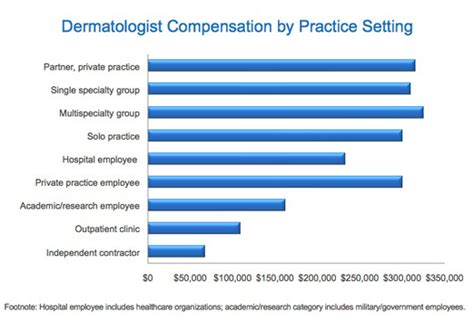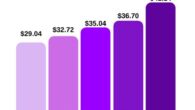Are you considering a career as a dermatologist? Not only is dermatology a rewarding field for those passionate about caring for skin health, but it also offers substantial financial rewards. In this blog post, we will explore the various factors that influence dermatologist salaries, including job prospects, educational requirements, specializations within the field, and the impact of experience level and geographic location. We will also compare dermatologist salaries in different countries and analyze the income potential in private practice versus academic settings. Additionally, we’ll delve into the earning potential through dermatology research and publications, as well as the benefits and perks beyond the basic salary that are available to dermatologists. By the end of this post, you will have a comprehensive understanding of the financial aspects of a career in dermatology and the potential rewards it offers.
Table of Contents
Job prospects for dermatologists
Job prospects for dermatologists are promising, with the demand for dermatological services expected to continue to grow in the coming years. As the population ages and awareness of skin health increases, the need for dermatologists is on the rise. Additionally, advancements in technology and treatment options are expanding the scope of dermatological care, creating new opportunities for dermatologists to specialize and advance their careers.
With the growing demand for skin care services, dermatologists can expect to have a wide range of employment options. They may work in hospitals, clinics, or private practices, or they may choose to focus on cosmetic dermatology, dermatopathology, or pediatric dermatology. The versatility of the field allows dermatologists to pursue various career paths, each with its own set of job prospects and opportunities for growth.
In addition to clinical positions, job prospects for dermatologists also include opportunities in research, academia, and industry. Many dermatologists choose to pursue academic positions, teaching and conducting research at medical schools and universities. Others may work in research and development for pharmaceutical or skincare companies, contributing to the development of new treatments and products for various skin conditions.
Overall, the job prospects for dermatologists are bright, with ample opportunities for career advancement and professional development. As the demand for skin care services continues to grow, dermatologists can expect to have a wide range of employment options, as well as opportunities to specialize, conduct research, and contribute to the advancement of the field.
Factors influencing dermatologist salaries
One of the key factors influencing dermatologist salaries is the level of experience. Dermatologists with more years of practice tend to earn higher salaries compared to those who are just starting out. Their level of expertise in diagnosing and treating various skin conditions also plays a significant role in determining their income potential.
Another factor is the geographic location of the dermatologist’s practice. Dermatologist salaries vary widely from one region to another, with those working in urban areas generally earning higher salaries compared to their counterparts in rural areas. This is often due to the cost of living and demand for dermatological services in different locations.
Specializations within dermatology can also impact dermatologist salaries. Dermatologists who specialize in cosmetic dermatology or dermatopathology may have higher earning potential compared to those in general practice, as their specialized skills are in higher demand and often command higher fees.
Lastly, the type of practice setting can influence dermatologist salaries. Those in private practice may have the potential to earn more than those working in academic or hospital settings, as they have more control over their fees and patient volume.
Educational requirements for becoming a dermatologist
When considering a career as a dermatologist, it’s important to understand the educational requirements. In order to become a dermatologist, individuals must first complete a bachelor’s degree, typically in a science-related field such as biology or chemistry. Following the completion of a bachelor’s degree, aspiring dermatologists must then attend medical school. Medical school typically takes four years to complete and includes coursework in subjects such as anatomy, biochemistry, and pharmacology.
After graduating from medical school, individuals looking to pursue a career in dermatology must then complete a residency program. Dermatology residency programs typically last three years and provide hands-on experience in the diagnosis and treatment of skin conditions. During their residency, aspiring dermatologists will work under the supervision of experienced dermatologists and gain valuable practical skills.
Once a residency program has been completed, individuals must then become board certified in dermatology. This involves passing a rigorous exam administered by the American Board of Dermatology. Board certification is essential for practicing as a dermatologist and demonstrates a commitment to maintaining high standards of patient care and professional competence.
It’s important to note that the educational requirements for becoming a dermatologist are demanding and require a significant time commitment. However, for those passionate about the field of dermatology, the educational journey is a rewarding investment in a fulfilling and impactful career.
Specializations within dermatology and their impact on earnings
Specializing in a specific area within dermatology can have a significant impact on a dermatologist’s earnings. Cosmetic dermatology, for example, is one of the most lucrative specializations within the field. Dermatologists who focus on cosmetic procedures such as Botox injections, laser hair removal, and dermal fillers often have higher earning potential due to the high demand for these services.
On the other hand, pediatric dermatologists may not have the same earning potential as those in cosmetic dermatology, as their patient demographic is smaller and the treatments they provide may not be as expensive. However, pediatric dermatologists play a crucial role in diagnosing and treating skin conditions in children, making their specialization equally valuable in terms of impact on overall healthcare.
Dermatopathology is another specialized area within dermatology that focuses on diagnosing and studying skin diseases at a microscopic level. Dermatopathologists, who often work in laboratory settings, may earn a higher salary due to the complexity and specialized nature of their work.
Overall, the impact of specializing in a particular area of dermatology on earnings can vary widely, with some specializations offering higher earning potential than others. However, it’s important to note that the value of each specialization extends beyond just financial gain, as each plays a vital role in promoting overall skin health and well-being.
Comparing salaries of dermatologists in different countries
When it comes to dermatologist salaries, it’s important to consider the differences that exist between countries. Salaries can vary greatly based on geographic location and factors such as cost of living, demand for dermatologists, and healthcare system differences.
For example, in countries with high demand for dermatologists and a strong emphasis on private healthcare, such as the United States, the average salary for dermatologists tends to be quite high. On the other hand, in countries with a more centralized or public healthcare system, such as Sweden or the United Kingdom, dermatologist salaries may be lower in comparison.
Another factor to consider is the cost of living in different countries. Even if a dermatologist salary appears lower in one country, it may actually provide a higher standard of living due to lower living expenses. In contrast, a higher salary in a country with a higher cost of living may not necessarily translate to greater overall financial comfort.
Ultimately, when comparing salaries of dermatologists in different countries, it’s essential to take into account various factors that contribute to the differences. This includes demand for dermatologists, healthcare system structures, and cost of living, all of which play a role in understanding the earning potential of dermatologists worldwide.
Income potential in private practice vs. academic settings
Income potential in private practice vs. academic settings
When considering a career in dermatology, one of the key factors to consider is the income potential in private practice versus academic settings. Dermatologists in private practice have the opportunity to earn a higher income compared to those in academic settings. In private practice, dermatologists have the potential to build a client base and establish a thriving business, which can lead to significant financial rewards.
On the other hand, dermatologists in academic settings may have a more stable but generally lower salary. While academic dermatologists have the opportunity to teach and conduct research, these roles often come with lower financial compensation compared to private practice. However, academic settings offer benefits such as job security, access to research funding, and the opportunity to make a significant impact on the field of dermatology.
It’s important to consider the trade-offs between private practice and academic settings when evaluating income potential. In private practice, dermatologists have the potential for higher earnings but may face greater financial risks and the demands of managing a business. In academic settings, dermatologists may have a more predictable salary and the opportunity to pursue research and teaching, but the potential for higher earnings may be limited.
In the end, the decision between private practice and academic settings often comes down to individual preferences and career goals. While income potential is an important factor to consider, it’s essential to also weigh other factors such as work-life balance, job satisfaction, and the ability to make a meaningful contribution to the field of dermatology.
How experience level affects dermatologist salaries
Experience level plays a significant role in determining the salaries of dermatologists. As dermatologists gain more experience in their field, they are able to command higher salaries due to their knowledge and expertise in diagnosing and treating skin conditions. This increase in salary is often a result of the reputation and patient base that dermatologists build over time.
In addition to salary increases, experienced dermatologists also have the opportunity to take on leadership roles within their practice or institution, which can lead to additional financial rewards. These leadership positions may include serving as a medical director, department chair, or mentor for junior dermatologists, all of which come with higher compensation and benefits.
Furthermore, as dermatologists gain more experience, they may have the opportunity to expand their scope of practice and offer more specialized services that are in high demand, such as cosmetic dermatology procedures or treatment of rare skin conditions. These specialized services often come with higher fees, resulting in increased earning potential for experienced dermatologists.
Overall, experience level has a direct impact on the salaries of dermatologists, as it allows them to build a strong reputation, take on leadership roles, and offer specialized services that contribute to their financial success in the field of dermatology.
Earning potential through dermatology research and publications
One of the key factors that can significantly impact a dermatologist’s earning potential is their involvement in research and publications within the field of dermatology. Research opportunities and academic publications not only contribute to the advancement of dermatology as a whole but can also have a substantial impact on a dermatologist’s income.
By conducting innovative research and publishing their findings in reputable medical journals, dermatologists can gain recognition and establish themselves as experts in their field. This can lead to opportunities for speaking engagements at conferences, consulting roles, and collaborations with pharmaceutical companies, all of which can enhance their earning potential.
Additionally, dermatologists involved in research may have the opportunity to apply for grants and funding to support their work, which can provide additional income. Furthermore, if their research leads to the development of new treatments or medications, they may also receive royalties or financial compensation for their contributions to medical advancements.
Overall, active involvement in dermatology research and publications can not only contribute to the advancement of the field but also provide dermatologists with valuable opportunities to increase their earning potential and establish themselves as leaders in the industry.
Impact of geographic location on dermatologist salaries
When it comes to determining a dermatologist’s salary, geographic location plays a significant role. The location of a practice can have a substantial impact on the earning potential of dermatologists. Urban areas tend to offer higher salaries than rural areas, as the demand for dermatological services is often higher in cities. Additionally, the cost of living in urban areas is typically higher, resulting in higher salaries to offset the increased expenses.
On the other hand, rural practices may offer lower salaries due to decreased demand for dermatological services and a lower cost of living. It’s important for dermatologists to consider the location of their practice when evaluating potential earnings and job opportunities. Factors such as population demographics, competition from other practices, and local economies can all influence the salary potential for dermatologists in different geographic locations.
Moreover, the geographic location also affects the availability of resources and technology that can impact a dermatologist’s earning potential. Urban areas may have access to state-of-the-art equipment and facilities, which can lead to higher salaries for dermatologists working in these locations. On the other hand, rural practices may have limited access to resources, which can impact the types of services offered and, consequently, the earning potential of dermatologists.
In conclusion, the impact of geographic location on dermatologist salaries is significant. Factors such as demand for services, cost of living, competition, and access to resources all play a role in determining the earning potential for dermatologists in different locations. It’s essential for dermatologists to carefully consider these factors when making decisions about where to practice and the potential financial implications of their geographic location.
Benefits and perks beyond the basic salary for dermatologists
Many dermatologists enjoy additional benefits and perks beyond their basic salary, making this field an attractive career choice. One notable benefit is the opportunity for flexible work schedules, which allows dermatologists to maintain a healthy work-life balance. This can include options for part-time, remote, or freelance work, as well as flexible hours within a traditional practice setting.
Another significant perk for dermatologists is the potential for career advancement and professional development. This can come in the form of opportunities for leadership roles, specialized training and certification programs, and access to cutting-edge technologies and treatments. These advancements not only benefit the dermatologist personally, but also contribute to the overall success and reputation of their practice or institution.
In addition to these benefits, many dermatologists have access to comprehensive health insurance packages, retirement plans, and other financial incentives. These can include bonuses, profit sharing, and performance-based incentives, which can significantly increase a dermatologist’s total compensation.
Lastly, dermatologists often have the opportunity to participate in research and clinical trials, which can provide intellectual stimulation, networking opportunities, and potential for groundbreaking discoveries. This can lead to professional recognition, publications, and invitations to speak at conferences, further enhancing the dermatologist’s reputation and career prospects.






